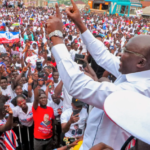The absence of a Junior High School (JHS) at Akwamu-Aboasa Presbyterian Basic School in the Asuogyaman District has led to high dropout rates among students in the community.
Pupils from the only public basic school in the community travel long distances to Kwanyarko, a nearby community, to continue their education beyond class six.
The long journey exposes students to the dangers of speeding vehicles on the Kpong-Ho highway.
Aboasa Presbyterian Basic School in Asuogyaman is one such school that has existed for over 60 years without a JHS.
Sampson Mudetse, Headteacher said the situation has led to high dropouts after Class Six as some of the students fail to continue to JHS in other communities.

To address such educational challenges in Akwamu-Aboasa, the Member of Parliament for Asuogyaman, Thomas Ampem Nyarko, has initiated the construction of a JHS block at Aboasa Presbyterian Basic School.
This effort is the third project of its kind by the MP, aimed at providing better access to education for local students.
“I am constructing three classroom blocks, a staff common room, a head teacher’s office, and a toilet facility for the Aboasa Presby Basic School. The Aboasa community currently doesn’t have a JHS. The school ends at class six and they are expected to move to the next town to access JHS education just as I have done for two other communities -Abomayaw and Adome-Maamewater I should establish brand new JHS also for the good people of Aboasa” The MP said.
Thomas Ampem Nyarko is hopeful the project will be near completion by September ready for intake of the first batch of students.
“So what we have started today we are hoping that by September it will get to a level where current students in class six can access it as first-year students in the JHS. I do not envisage that the project will be fully completed by September but what I am hopeful about is that it can get to a level where the students can use,” Asuogyaman MP said.
The Asuogyaman District Director of Education, Madam Augustina Adjoa Owusu, praised the MP’s initiative stating that many Basic schools are in need of JHS facilities.
Some of the schools are not having JHS schools some do not also having kindergarten. So this project will go a long way to help our students in the sense that they travel from this town to the next town to go to JHS and the new project is going to help them sit comfortably in their own school, continue their education without stress because when they are traveling from the roadside to the next school there can be accident anything can help. Also, they get to school tired and unable to concentrate”
Parents in the Aboasa community say the new JHS will alleviate their fears and offer students safer and easier access to education in their own community.
The 2021 population and housing census shows that more than 1.2 million children between the ages of 4 and 17 in Ghana are not enrolled in school.
Furthermore, around 4,000 primary schools lack JHS facilities, and over 5,000 basic schools have inadequate infrastructure, such as classrooms under trees or dilapidated structures.
Civil society organizations such as SEND Ghana attribute these challenges to the government’s excessive focus on secondary education, leaving basic schools with insufficient resources, including reading materials, furniture, and teachers.
Source: Ghana/Starrfm.com.gh/Kojo Ansah




